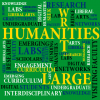Humanities on Demand

2012 to 2013
Emerging Networks
Most humanities faculty members unilaterally determine the themes, authors, books, blogs, and other materials to appear in an undergraduate level syllabus. Conversely, within most humanities classrooms, the same faculty members apply a more student-centered approach, where students are viewed not as passive receptacles of instructional data but as active contributors. The conveners of this project could think of no sound pedagogical reason for summarily rejecting student input at the course-building phase. Consequently, they constructed a cutting-edge website that provided students with the opportunity to suggest material for their pilot course, Humanities on Demand: Narratives Gone Viral. Approximately six months before this course opened for enrollment, undergraduate students – whether they planned on enrolling in the course or not – were invited to visit theHumanities on Demand website (see snapshot below) and suggest course content befitting the class subject (see course description/content submission guidelines).
In order to make this an integrated exploration of narrative, they asked students to upload narratives that they found meaningful, amusing, perplexing, and/or interesting. Online submissions chosen by the faculty were combined with already established course materials.
People
|
undergraduate student, Economics |
ACLS New Faculty Fellow, Religion and Classical Studies |
ACLS New Faculty Fellow, Cultural Anthropology and Slavic and Eurasian Studies |
|
Assistant Professor of Germanic Languages and Literature |
ACLS New Faculty Fellow, German Studies and the Program in Literature |
ACLS New Faculty Fellow, Political Science |
|
Graduate Student, Civil Engineering |
ACLS New Faculty Fellow, History |
Highlights
|
"Crowdsourcing" the Humanities
-- May 21 2013
One of the early projects supported by Humanities Writ Large, Humanities on Demand, allowed ACLS Fellow and Visiting Assistant Professor Michael P. Ryan the chance to experiment with students... Read More |
What are you watching, listening to, thinking about, obsessing over?
-- Oct 8 2012
What video have you been watching obsessively on YouTube? What meme popped up on your Facebook feed today for the hundredth time? What crazy forwarded email did you get from your grandmother... Read More |










